
Philosophies
Scope & Guideline
Connecting minds through open access to knowledge.
Introduction
Aims and Scopes
- Interdisciplinary Philosophy:
The journal promotes interdisciplinary approaches, combining insights from philosophy, science, art, and social sciences to address complex contemporary problems. - Ethics and Moral Philosophy:
A strong focus on ethical considerations, particularly in relation to current global challenges such as climate change, technology, and social justice. - Historical and Comparative Philosophy:
Exploration of historical philosophical traditions and their relevance to modern issues, including comparative studies between Western and Eastern philosophical frameworks. - Philosophy of Mind and Consciousness:
Investigation into the nature of consciousness, cognition, and the implications of artificial intelligence, emphasizing the intersection of philosophy and cognitive science. - Environmental and Ecological Philosophy:
A commitment to addressing ecological issues through philosophical inquiry, emphasizing the ethical dimensions of environmental concerns and sustainability. - Cultural and Social Philosophy:
Critical analysis of cultural phenomena and social practices, with an emphasis on how philosophical thought can inform and critique societal norms.
Trending and Emerging
- Technology and AI Ethics:
There is a significant increase in discussions surrounding the ethical implications of artificial intelligence and technology, highlighting concerns about agency, responsibility, and the impact of these advancements on society. - Ecological and Environmental Ethics:
A growing emphasis on ecological philosophy and environmental ethics is evident, as scholars seek to address urgent issues related to climate change and sustainability through a philosophical lens. - Intersectionality and Social Justice:
The journal is increasingly focusing on intersectional approaches to social justice, exploring how various identities and social categories intersect in ethical considerations and philosophical discourse. - Philosophy of Care and Well-Being:
Emerging themes around care ethics, well-being, and the moral implications of caregiving reflect a shift towards understanding the relational aspects of ethical considerations in personal and societal contexts. - Cultural and Global Philosophical Dialogues:
There is a rising interest in global philosophy and cross-cultural dialogues, as scholars seek to integrate diverse philosophical traditions into contemporary discussions.
Declining or Waning
- Metaphysical Speculation:
There has been a noticeable decrease in papers centered on traditional metaphysical questions, suggesting a shift towards more practical and applied philosophical inquiries. - Analytic Philosophy:
While the journal has historically included analytic philosophy, recent publications indicate a waning interest, with fewer papers engaging in formal logic or analytic methods. - Purely Theoretical Discussions:
The trend towards applied ethics and real-world implications has overshadowed purely theoretical discussions, leading to a decline in abstract philosophical debates. - Philosophy of Language:
Themes related to the philosophy of language have become less frequent, possibly due to a broader trend favoring interdisciplinary approaches that incorporate linguistic insights into social and cultural contexts.
Similar Journals

REVUE PHILOSOPHIQUE DE LA FRANCE ET DE L ETRANGER
Bridging Philosophical Thought Across NationsREVUE PHILOSOPHIQUE DE LA FRANCE ET DE L'ETRANGER is a distinguished academic journal published by PRESSES UNIV FRANCE, focusing primarily on the field of philosophy. Established in 1949 and continuing its legacy into 2023, this journal serves as a vital platform for scholarly dialogue and exploration of philosophical ideas that transcend national boundaries. While it currently holds a Q4 ranking in the philosophy category according to the latest Scopus assessments, its contributions remain significant in fostering a comprehensive understanding of various philosophical discourses. Based in France, at 6 AVENUE REILLE, 75685 PARIS CEDEX 14, this journal provides an essential resource for researchers, professionals, and students alike, despite not being an open-access publication. Each issue encourages a deeper engagement with contemporary philosophical thought while contributing to the academic community's ongoing discussions on fundamental philosophical questions.

Prometeica-Revista de Filosofia y Ciencias
Fostering Innovative Dialogue in Philosophy and SciencePrometeica-Revista de Filosofia y Ciencias, published by LUCAS EMMANUEL MISSERI in Argentina, serves as a pivotal platform in the realms of philosophy and the history of science since its establishment in 2010 as an Open Access journal. With an ISSN and E-ISSN of 1852-9488, this journal not only emphasizes accessibility but also engages a diverse audience encompassing researchers, professionals, and students eager to explore the intersections of philosophical inquiry and scientific understanding. As of 2023, Prometeica boasts a commendable Q2 ranking in Philosophy and a Q3 ranking in the History and Philosophy of Science, reflecting its growing influence in academic discourse. Despite its rising status, with Scopus rankings indicating a niche yet dedicated readership, the journal remains committed to fostering innovative dialogue and critical thought in the philosophical community. This strategically positioned journal invites contributions that not only advance theoretical perspectives but also address contemporary issues within the philosophical and scientific domains, ensuring relevance and impact for its readers.

Sophia
Exploring the Depths of Philosophy and FaithSophia, a prestigious journal published by Springer, is a leading platform for the advancement of knowledge in the fields of Philosophy and Religious Studies. Established in 1962, this open-access journal has embraced a global perspective and invites scholarly contributions that explore complex philosophical questions and the intricacies of religious thought. With an impact factor that reflects its significance, Sophia ranks in the top quartiles of its categories on Scopus, specifically Q2 in Philosophy and Q1 in Religious Studies, showcasing its influence and reach within the academic community. With convenient open access options available since 2009, the journal ensures that research disseminates freely, promoting engagement among researchers, professionals, and students alike. Located in the Netherlands and connected to a reputable international network, Sophia remains committed to fostering intellectual dialogue and enriching the discourse surrounding philosophical and religious issues worldwide.

Filozofska Istrazivanja
Unlocking New Insights in Philosophical ResearchFilozofska Istrazivanja is a distinguished open-access journal dedicated to the field of philosophy, published by the Croatian Philosophical Society. Since its inception, the journal has provided a platform for the dissemination of philosophical research, fostering scholarly dialogue and critical engagement within the discipline. With an ISSN of 0351-4706, this journal has been freely accessible to readers since 2005, reflecting its commitment to promoting knowledge and accessibility in the academic community. As measured by its Q4 in Philosophy category quartile for 2023 and its Scopus ranking of #770/806 in the Arts and Humanities field, Filozofska Istrazivanja continues to serve as a crucial resource for researchers, educators, and students alike seeking to explore contemporary philosophical issues and debates. The journal encourages submissions that contribute to various philosophical subfields, enriching the discourse and providing new insights that can elevate the understanding of philosophical thought.

PHILOSOPHICAL STUDIES
Unraveling Complexities of Thought Since 1950Philosophical Studies, published by Springer, is a prestigious peer-reviewed journal that stands at the forefront of philosophical discourse since its inception in 1950. With ISSN 0031-8116 and E-ISSN 1573-0883, this journal has firmly established itself as a critical platform for disseminating high-quality research in philosophy, positioned in the Q1 category for Philosophy with an impressive Scopus rank of #73 out of 806, placing it in the 90th percentile of its field. Although it does not offer Open Access, the journal’s rigorous selection process ensures that only the most relevant and impactful studies are published, making it an invaluable resource for philosophers, academics, and students alike. With a commitment to advancing philosophical inquiry and fostering a vibrant scholarly community, Philosophical Studies continues to attract contributions that challenge prevailing paradigms and explore new dimensions in philosophical thought. The journal's scope encompasses a wide array of topics within philosophy, encouraging interdisciplinary engagement and dialogue.
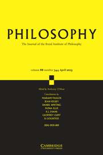
PHILOSOPHY
Engaging with the Foundations of KnowledgePHILOSOPHY, published by Cambridge University Press, stands as a premier journal in the field of philosophy, boasting a significant impact with a prestigious Q1 classification and an admirable ranking of #167 out of 806 in the Arts and Humanities category as of 2023. With a history that dates back to 1926 and continuing through 2024, this journal has established itself as an essential platform for disseminating groundbreaking research and innovative ideas in philosophical discourse. Although it does not offer open access, the journal's reach is substantial, contributing to scholarly conversations across various domains within the discipline. Researchers, professionals, and students alike benefit from a wealth of articles that explore critical philosophical questions, encourage rigorous debate, and present diverse perspectives. Access to PHILOSOPHY ensures engagement with leading-edge scholarship that shapes contemporary thought and advances understanding in this dynamic field.
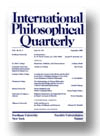
INTERNATIONAL PHILOSOPHICAL QUARTERLY
Exploring the Depths of Philosophical InquiryINTERNATIONAL PHILOSOPHICAL QUARTERLY, published by the PHILOSOPHY DOCUMENTATION CENTER, stands as a vital resource for scholars and practitioners engaged in philosophical inquiry. With an ISSN of 0019-0365 and an E-ISSN of 2153-8077, this esteemed journal has published thought-provoking discussions and analyses in philosophy since its inception in 1974. The journal is housed in the United States at PO BOX 7147, CHARLOTTESVILLE, VA 22906-7147, and has shown a commitment to advancing philosophical debates across its converged years from 1974 to 2023. Recognized with a Q3 rating in the philosophy category for 2023, it ranks 511 out of 806 within Scopus, positioning it within the 36th percentile of its peers. Although not an open-access publication, it continues to offer critical insights that foster scholarly dialogue and research within the field. This journal is especially pertinent to researchers, professionals, and students who seek to deepen their understanding of contemporary philosophical issues and engage with a diverse array of philosophical perspectives.
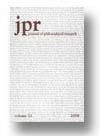
Journal of Philosophical Research
Cultivating a Rich Repository of Philosophical IdeasThe Journal of Philosophical Research, published by the PHILOSOPHY DOCUMENTATION CENTER, stands as a significant conduit for scholarly dialogue in the field of philosophy. With the ISSN 1053-8364 and E-ISSN 2153-7984, this journal has been instrumental in fostering academic discourse from its inception in 2002. Although not open access, it maintains a robust reputation, evidenced by its Q3 ranking in the philosophy category for 2023 and a commendable position in the Scopus Ranks (Rank #287 out of 806) reflecting the journal's impact factor in the arts and humanities. The journal's rigorous selection process ensures the publication of high-quality, peer-reviewed articles covering a broad spectrum of philosophical inquiries, making it an essential resource for researchers, professionals, and students alike. Situated in Charlottesville, Virginia, it exemplifies the commitment to advancing philosophical understanding and scholarship, while serving as a valuable repository of contemporary philosophical thought.
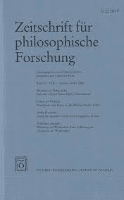
ZEITSCHRIFT FUR PHILOSOPHISCHE FORSCHUNG
Pioneering New Perspectives in Philosophical Thought.ZEITSCHRIFT FUR PHILOSOPHISCHE FORSCHUNG is a prestigious academic journal published by Vittorio Klostermann GmbH in Germany, dedicated to the interdisciplinary field of philosophy. With its ISSN 0044-3301 and E-ISSN 1439-2615, this journal has made significant contributions to the philosophical discourse since its inception in 1977, continuing its pursuit of excellence in scholarship through 2024. Recognized in the 2023 category quartiles as Q2 in Philosophy, it is ranked #498 out of 806 in the Arts and Humanities' Philosophy classification by Scopus, placing it in the 38th percentile. Although it currently does not offer open access options, its rigorous peer-reviewed articles serve to enrich the scholarly community's understanding of complex philosophical issues. ZEITSCHRIFT FUR PHILOSOPHISCHE FORSCHUNG plays a vital role in advancing philosophical research in a collaborative academic environment, making it a valuable resource for researchers, professionals, and students alike.
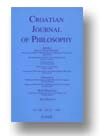
Croatian Journal of Philosophy
Cultivating Scholarly Discourse Since 2008Croatian Journal of Philosophy is a distinguished academic platform dedicated to the advancement of philosophical discourse, published by KRUZAK D O O. With an ISSN of 1333-1108 and an E-ISSN of 1847-6139, this journal has been a key player in the field since its inception in 2008, continuing to progress through its converged years until 2024. Recognized for its scholarly contributions, it holds a prestigious placement in Q3 within the philosophy category for 2023 and ranks #571 out of 806 in Scopus, reflecting its engagement with a broad spectrum of scholarly discussions and ideas. Though it operates without an Open Access model, the journal remains a vital resource for researchers, professionals, and students who are keen to explore contemporary and traditional philosophical issues from diverse perspectives. The journal's commitment to expanding the boundaries of philosophical inquiry emphasizes the significance of interdisciplinary dialogue, making it a reputable choice for those seeking to deepen their understanding of philosophical thought.